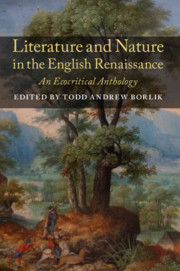Book contents
- Frontmatter
- Contents
- List of Illustrations
- Acknowledgements
- Editorial Principles: Towards the Ecocritical Editing of Renaissance Texts
- Introduction
- PART I Cosmologies
- PART II The Tangled Chain
- PART III Time and Place
- PART IV Interactions
- PART V Environmental Problems in Early Modern England
- PART VI Disaster and Resilience in the Little Ice Age
- Appendix A Industrialization and Environmental Legislation in the Early Anthropocene: A Timeline
- Appendix B Further Reading: A Bibliography of Environmental Scholarship on the English Renaissance
Editorial Principles: Towards the Ecocritical Editing of Renaissance Texts
Published online by Cambridge University Press: 05 June 2019
- Frontmatter
- Contents
- List of Illustrations
- Acknowledgements
- Editorial Principles: Towards the Ecocritical Editing of Renaissance Texts
- Introduction
- PART I Cosmologies
- PART II The Tangled Chain
- PART III Time and Place
- PART IV Interactions
- PART V Environmental Problems in Early Modern England
- PART VI Disaster and Resilience in the Little Ice Age
- Appendix A Industrialization and Environmental Legislation in the Early Anthropocene: A Timeline
- Appendix B Further Reading: A Bibliography of Environmental Scholarship on the English Renaissance
Summary
At the outset, some decisions were made to prepare this anthology in accordance with a few basic guidelines:
• Modernize spelling and punctuation (exceptions noted below).
• Annotate to define archaic words, explain obscure allusions, and record original spellings or textual variants where they may have added significance (particularly if they assist ecocritical interpretation).
• Preserve capitalization when it has rhetorical force, or may imply elevation to a proper noun.
• Preserve original punctuation when it may aid comprehension or enhance rhetorical impact.
• Deploy diacritical marks and syncope in verse to help with scansion.
Each of these choices has significant implications, and thus calls for a brief defence. Modernizing is of course a standard practice with editions intended for classroom use. Thanks to the growing accessibility of Renaissance books in digital format, the need for original spelling is no longer so pressing. Readability seems paramount. Moreover, modernizing should, if only on a subliminal level, help drive home the message that Elizabethan writers, while not exactly our contemporaries, were tussling with and can speak to problems not unfamiliar to twenty-first-century readers. As for punctuation, the plain fact is that in many early modern books it is not authorial but was often left to the whims of the compositors or printers. Sniffing at a modernized text thus seems as obstinate as refusing to attend a production of Shakespeare in modern dress or pronunciation.
Nevertheless, during the painstaking process of editing this anthology I became increasingly aware of the pitfalls of strict modernization. Due to the scope of the contents, implementing a rigid one-size-fits-all policy seemed far too constrictive. The verse of Skelton and the prose of Aubrey call for very different editorial interventions in both degree and kind. As its critics have observed, modernized spelling can blunt or efface the polysemous complexity of certain words. For instance, early modern readers encountering a “for rest” are subtly alerted to its status as a game preserve, a shelter where beasts go “for rest.” When a tract by Winstanley spells mankind as “Manking” and oppression as “oppresin,” can one be confident that these are mere typos and silently emend them? Similarly, it seems almost collusive to ignore that a royal hunt and bear-baiting took place at “Killingworth” (instead of Kenilworth) Castle.
- Type
- Chapter
- Information
- Literature and Nature in the English RenaissanceAn Ecocritical Anthology, pp. xviii - xxiiPublisher: Cambridge University PressPrint publication year: 2019



